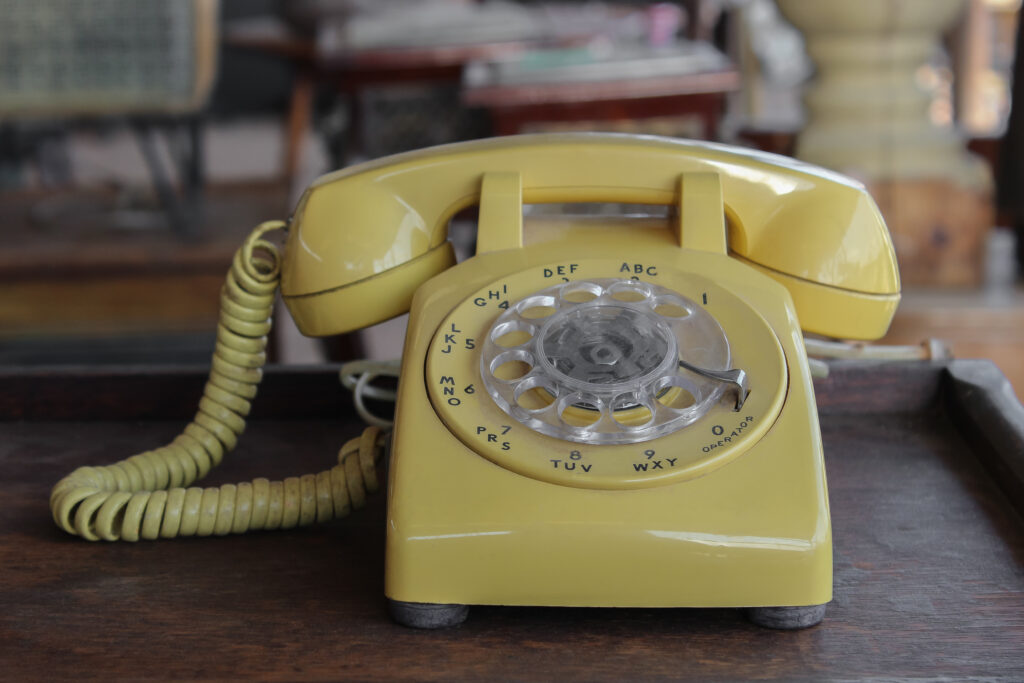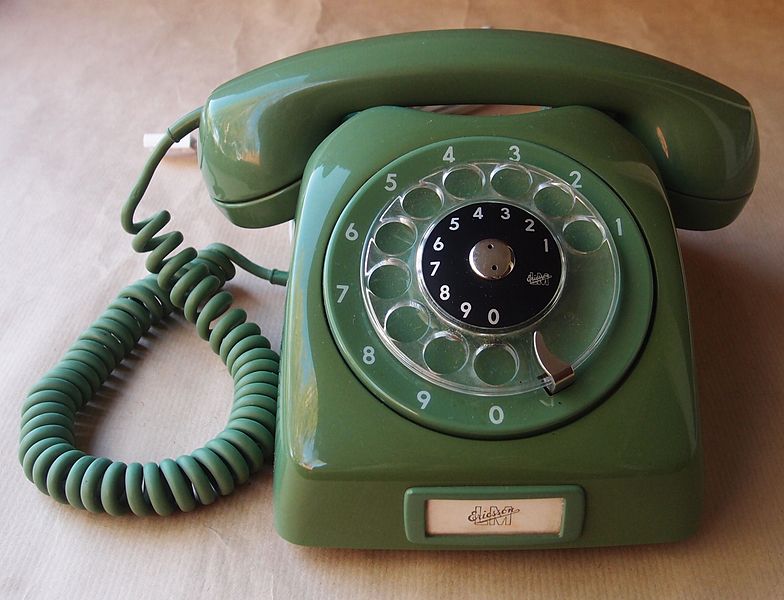
Yellow telephone. Courtesy of Wikimedia Commons. Licensed under CCO 2.0.
Last night I had a dream that Kim Kardashian and I were planning a lunch for a whole bunch of people. I have no idea who those people were. I just know that Kim and I had to plan a lunch together, a small one, maybe a lunch that would serve as a planning session for a second, larger lunch. It is my suspicion that in this dream I was working as a publicist, which serves me right, because I have been short with a few publicists in my life, though I do love a good publicist and appreciate that I myself would not be a good publicist. But in this dream I seemed to be holding my own.
Kim and I talked on the phone for a long time, making plans, debating salads, sandwiches, “small plates,” and the amounts of each that we needed. What would people drink? How many different canned or bottled drinks did we need? We said “uh-huh” and “mmmm” a lot. I was intensely bored but also aware that I was talking to Kim Kardashian. I could see Kim in my dream even though I was talking to her on a landline, a situation where you do not see the person you’re talking to. I was in the dream and watching it too.
I should have known I was in a dream because both of our phones were old-fashioned ones, with long coiled plastic cords. Kim’s phone was avocado green, mine bright yellow. Both of the phones in my house growing up—one attached to the kitchen wall, and one the kind you could walk around with, with an extra long cord, that was stationed in my parents’ bedroom—were white or off-white.

Kim’s “dream phone.” Courtesy of Wikimedia Commons, licensed under CCO 3.0.
When I am forced to recall old-fashioned phones because they appear in my dreams, I remember things like trying to dial quietly when I wasn’t supposed to be dialing, when it was past nine, and then, as I got older, past ten. I remember how this entailed not letting the dial spring back on its own—this makes a lot of noise especially in an old house where you can hear everything—but guiding it carefully with your finger, and the trick was you had to keep the dial moving steadily because sometimes if the dial did not keep up a steady movement the call would get canceled, and you’d get a dial tone again. I remember it was maddening but also a fun challenge, and I remember that when I succeeded in making a call without my parents hearing it was a sweet victory.
I remember my friend Martha and I would talk on the phone for hours while I laid on that hobnail-weave white bedspread, looking out the west windows at the inn next door, which was grandly turreted but gave off a sense of defeat. It was owned by a couple who had escaped the Holocaust. The woman was much younger than the man, and he had helped her escape. He used to put people on boats, and he put her on a boat. I think she felt she owed him her life after that, literally. She was wonderful. He was terrible. He had medical-problem-grade bad breath. She didn’t like him but she was always making him food. My mom was really good friends with the wife. She understood her plight as a woman.
I talked on the phone a lot during my prime phone-talking years, 1977 to 1987, from that perch on that bed, watching the lights go on and off in the small living quarters on the first floor of the inn. Guests were infrequent in the winter months, but in the summer, the place was full of musicians working at Tanglewood and music people attending events there.
Ours was a crowded town in summertime, so there was money to be made. We had some summer lodgers too. I don’t know if it was overflow from the inn or a separate deal. A musician, or maybe a classical music journalist, once stayed in our house, in my room. I stayed in my brother’s room and barely laid eyes on the lodger. But toward the end of his stay, he accused me of stealing his pajamas. I was maybe seven or eight. My mother told him he was crazy. We never took in a lodger again. I kept asking my mom, “Why did that guy think I took his pajamas?” I felt like there was something wrong with me that he would think this. She told me not to worry about it, that the guy was nuts.
I clearly had the dream about Kim Kardashian (who was wearing a seventies-era three-piece pantsuit with a skirt over it, exactly like the purple and pink flowered one my mom used to wear to parties with white square heels) just to bring back all that other stuff: the phones, the inn, the couple who escaped Europe on a boat, the pajama guy. I don’t particularly care about Kim Kardashian. I think she is gorgeous. She is obviously a skilled dieter or a skilled tolerator of Ozempic. I do remember that I wanted to please her. I was conscious of not boring her. My memories of the dream are hazy but I do remember saying, “How much potato salad do you think we will need, Kim?” and she didn’t reply—she acted as if I hadn’t said anything. I distinctly remember thinking, “Why would you ever mention potato salad to Kim Kardashian, you absolute fool,” and then, like her, pretending it hadn’t happened.
I figured out why Kim was in the dream, though. I hate the way she talks into her iPhone, always laying it flat and putting everyone on speaker. I think it’s how people on reality shows talk on the phone, and now everyone does this, using their hand as a big phone platter and holding out their manicures. By putting Kim on a landline in my dream, I guess I was trying to castrate her.
As for the pajama guy, a month later I found his pajamas wadded up in the living room of my dollhouse. I did not, just kidding. Really I have no idea where they ended up, if they even existed, or if they just floated around in his mind with oboe solos, the way Kim Kardashian floats around in mine.

Kim Kardashian Elle magazine beach shoot, seen from above. Courtesy of Wikimedia Commons. Licensed under CCO 3.0.
Sarah Miller is a writer who lives in California. She writes a Substack.
from The Paris Review https://ift.tt/plu8oXv
Comments
Post a Comment